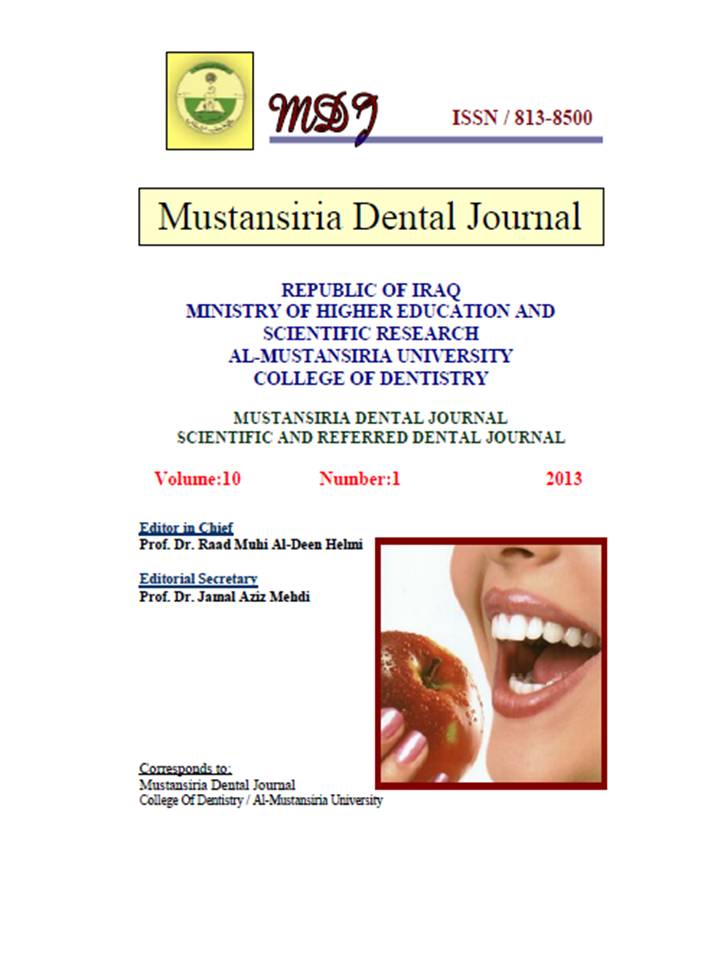Temperature Effect on the Hardness of Different types of Resin Denture Base Materials
DOI:
https://doi.org/10.32828/mdj.v10i1.186Keywords:
Key words: Resin denture base Materials, hardness, temperatureAbstract
The cold cured acrylic resin is inferior to heat cured acrylic resin from stand point
of strength and degree of polymerization. Many attempts have been made to improve
these properties. Because heat affects maturity of the chemical reaction of acrylic
resin therefore its maintenance during polymerization will affect the properties of
cured resin.
The purpose of this study was to evaluate the effect of increase curing temperature
on the hardness of two commercially available cold cured acrylic resin material
(Holland and Germany type) in comparison to heat cure resin and to those(cold cure)
curing by conventional methods in air at 23°C ± 5°C.
Ninety specimens,10 specimens from heat cure resin curing by water bath(short
cycle) and eighty specimens from cold cured acrylic [forty from cold cured
acrylic(Holland Type) and forty from cold cured acrylic(Germany type)] were
prepared , flasking and packing procedure were done according to manufacturer
direction and divided according to processing as follow:20 specimens(10 from
Holland type and 10 from Germany type) were processed in air for two hours at 23°C
± 5°C under press (bench curing) as a control, and 60 specimens(30 from Holland
type and 30 from Germany type) were processed by ivomat curing device containing
water under air pressure 30 Pascal for 15 minutes at different temperature: 40°C,
60°C, and 80°C(10 specimens for each groups) .All specimens were tested for
hardness test by shore D device (adigital model) for measuring the indentation
hardness of the specimens the test load was set to 50 Newton for shore (( D ))which is
suitable for acrylic resin material .
Result showed that heat cure resin show the maximum value of hardness
(88.8),followed by cold cured acrylic type Germany( polymerized by elevated
temperature 80˚C) (88.696) followed by cold cured acrylic type Holland polymerized
at 60˚C(88.471). While control group type Germany (polymerized at air bench)
recorded the minimum value of hardness (81.83). All groups that polymerized at high
temperature: 40°C, 60°C, and 80°C show the higher value of hardness in comparison
to those processed by conventional methods (at air bench at 23°C ± 5°C) with
significant and highly significant differences. There were highly significant
differences between heat cure acrylic and cold cure (both types) processed by
conventional methods and with cold cure Holland type processed at 40˚C, but there
were no significant differences between heat cure acrylic and cold cure (both types)
processed at high temperatures.

Downloads
Published
Issue
Section
License
The Journal of Mustansiria Dental Journal is an open-access journal that all contents are free of charge. Articles of this journal are licensed under the terms of the Creative Commons Attribution International Public License CC-BY 4.0 (https://creativecommons.org/licenses/by/4.0/legalcode) that licensees are unrestrictly allowed to search, download, share, distribute, print, or link to the full texts of the articles, crawl them for indexing and reproduce any medium of the articles provided that they give the author(s) proper credits (citation). The journal allows the author(s) to retain the copyright of their published article.
Creative Commons-Attribution (BY)








